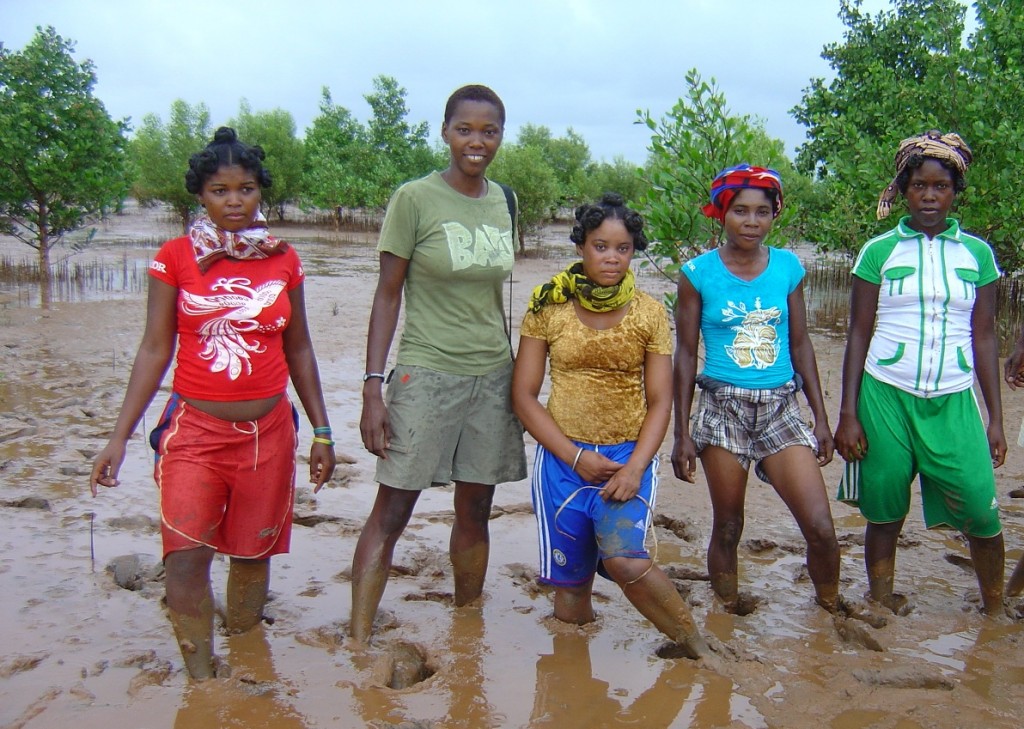In the seventh instalment in our series of Q&As with Blue Ventures staff, we ask Sylvia Paulot, our Mangrove Carbon Scientist, some searching questions about science, conservation and superpowers…
What is your scientific background?
I studied Environmental Science at Sebelas Maret University, in Central Java, Indonesia. But I must admit that I’m still learning to be a scientist, given the fact that there is always something new to learn, especially with the Blue Carbon project that I’m working on.
Why do you do what you do?
Well, I guess reasonable people do what they do because they love it, so it’s the same for me as well, I love what I do. I firmly believe that effective natural resource management can help local communities living around those resources to develop their village and improve their lives, exactly what we are trying to achieve with our project. We are helping communities at our project sites improve their livelihoods and diversifying their sources of income and I’m happy to be able to participate in that.
What’s more, I have lived amongst various communities – the Javanese community in Java Island, Indonesia, the Dayak Nganju community in Central Kalimantan, Borneo, the Karen and Mon refugee communities (Burmese minority) in Sangklaburi and the Thai fishers in Trang, Thailand – and being with those communities awakened me. While working with them, my mind was always at home. I wanted to be able to do the same thing here at home in Madagascar, serving and helping the communities in my country. This is what I’m doing now, so I guess I can say that for me, this is a dream come true.
What is the best/worst thing about being a conservation scientist?
Being a conservation scientist isn’t easy – you have to really use your brain to analyse and find solutions for social issues that lead to deforestation while improving the livelihoods of the local communities at the same time. This is very challenging and requires patience, but I guess that the best thing is that you are never bored.
The worst thing is surely being in a middle of mangrove forest, when thousands of mosquitoes attack you at the same time because you have forgotten your mosquito repellent. Believe me, it is not such a fun situation to find yourself in!
What do you enjoy most about your job?
I like working in a multicultural environment. The Blue Ventures team is very diverse. We have Zimbabwean, Canadian, American, French, English, Malagasy and Mexican people working here; a bunch of people coming from different backgrounds, with different hobbies and interests, but with a common willingness to improve the livelihoods of the communities we are working with. I’m learning so much from my coworkers, not only interesting things but surprising and strange things as well! However, I will not comment on that here or my colleagues might turn to me for more explanation…
What is your favourite species or group of species and why?
I will say starfish. They fascinate me so much. First, because they are seemingly simple invertebrates, but in reality they are complex and indispensable to their surroundings. Adding to that, they can be many different colours, which makes some of them very pleasant to find. Just looking at them, you might think that they are useless, yet they are anything but useless.
What would your science superpower be?
Probably a power to increase the carbon stocks in our mangroves a hundred thousand times or even more. Let me tell you why. More carbon in our mangroves means more money from carbon credit sales for the communities, if carbon projects are put into place and managed transparently. Then because of this money and the other services they offer, mangroves would surely be seen as precious, sacred or even magical and nobody would ever clear large areas of mangroves again.
What is one of the strangest things that has happened to you while working on conservation?
Living amongst Buddhist people in Thailand was strange. The culture was totally different and impressed me. I stayed only nine months in Thailand, but I left totally affected by the Buddhist culture; it hit me in the heart, to the point that if I had to choose or practice a religion now, I would choose Buddhism.


